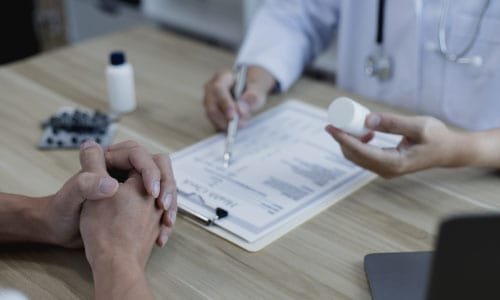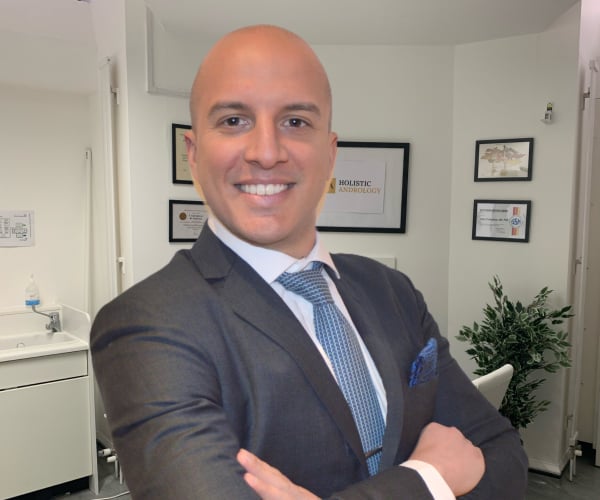In the UK, millions of men of all ages find themselves typing the same question into Google: “Who is the best doctor to see for erectile dysfunction?” This search stems not only from the desire to address a physical symptom, but also from a deeper need to find a competent and empathetic professional who can provide a genuine, lasting solution.
Managing erectile dysfunction means getting to the root of the problem, which may be vascular, hormonal, neurological, psychological – or often a combination of these. Choosing the right doctor from the outset is far from a minor detail: it is the key factor in speeding up diagnosis, gaining access to the most advanced treatments and restoring both sexual health and self-esteem.
A superficial approach risks leading to ineffective care, frustration and wasted time. This article serves as a practical guide to navigating the UK’s medical landscape in 2025 and deciding who to trust with your health.
Who is the Best Doctor to See for Erectile Dysfunction? Your Guide to the Specialists!
Managing erectile dysfunction can involve several different professionals. Understanding who does what is essential to ensure you see the right person.
The Urologist-Andrologist: the Key Specialist
The urologist with a sub-specialisation in andrology is, without a doubt, the specialist to turn to for erectile dysfunction. This doctor has in-depth knowledge of the anatomy, physiology and diseases of the male genitourinary system.
Key competencies:
- Performs advanced diagnostics to identify the exact cause (e.g. penile Doppler ultrasound).
- Manages all available treatments, from oral medicines to regenerative therapies through to prosthesis surgery.
- Treats associated conditions, such as Peyronie’s disease, hypogonadism (low testosterone) and prostate problems.
Prof. Fabio Castiglione, as Consultant Urologist and Andrologist, represents this specialist figure, offering a complete diagnostic and therapeutic pathway in London.
The General Practitioner (GP): the First Point of Contact

The General Practitioner (GP) is often the first professional people turn to. Their role is crucial as the initial point of contact:
- Rule out obvious causes and order basic blood tests.
- Prescribe first-line treatments, such as PDE5 inhibitors (e.g. Sildenafil).
- Refer the patient to the most appropriate specialist, usually a urologist (andrologist), if the problem persists or requires further investigation.
The Endocrinologist: the Hormone Specialist
When erectile dysfunction is linked to hormonal imbalances, the endocrinologist becomes a key figure. They intervene in cases such as:
- Hypogonadism: low testosterone levels.
- Thyroid disorders: hyper- or hypothyroidism.
- Hyperprolactinaemia: elevated prolactin levels.
The Cardiologist: the Guardian of Vascular Health
Erectile dysfunction is often an early warning sign of cardiovascular problems. Because the arteries in the penis are much smaller than the coronary arteries, issues with blood flow tend to appear there first. The cardiologist’s role is to assess overall cardiovascular risk and ensure that ED treatments are safe for the heart.
The Psychosexologist or Psychotherapist: Support for the Mind
The psychological component should never be underestimated. Performance anxiety, stress, depression, relationship difficulties, or even the impact of pornography can all trigger or aggravate erectile dysfunction.
A psychotherapist or clinical sexologist can help tackle these issues through targeted therapy.
The Importance of a Multidisciplinary Team
The “best doctor” is often the one who can coordinate a team. A multidisciplinary approach, where urologist, cardiologist, endocrinologist and psychologist collaborate, ensures that every aspect of the patient’s health is addressed, leading to better and more lasting results over time.
Find out now “who is the best doctor to go to for erectile dysfunction?” and book a personalised consultation with Prof. Castiglione in London. Call +447830398165.
How ED is Properly Assessed: Diagnostics in 2025
Effective treatment starts with a precise diagnosis. Here’s how a specialist approaches assessment today:
- Medical history: The specialist collects the patient’s medical background, asking about lifestyle, habits and current medicines (since some antihypertensives and antidepressants can affect erections).
- Validated questionnaires: Standardised tools such as the IIEF-5 (International Index of Erectile Function) make it possible to quantify the severity of the problem objectively.
- Laboratory tests: Blood tests are used to check hormone levels (total and free testosterone, LH, prolactin), blood glucose (to rule out undiagnosed diabetes) and lipid profile.
- Penile Doppler ultrasound: This is the gold-standard test for an accurate diagnosis. Performed in the clinic after a drug-induced erection, it visualises blood flow in the penile arteries and assesses the veno-occlusive mechanism. It is the only way to distinguish with certainty between an arterial and a venous cause (“venous leak”).
At Prof. Castiglione’s clinic in London, this diagnostic pathway is carried out with the utmost care to build a complete clinical picture before deciding on any treatment.
From Symptom to Cure: Choosing the Best Treatment for You

The “best treatment” is not the same for everyone. It is the option that offers the greatest effectiveness and safety for the individual patient, taking into account their age, overall health, the severity of ED and personal preferences.
Here’s a full overview of the options available in the UK.
Lifestyle and Prevention
The foundation of everything. Weight control, regular physical activity, quality sleep, reducing smoking and alcohol, stress management, and pelvic floor exercises can all make a significant difference to erectile function.
PDE5 Inhibitors
Oral medicines (Sildenafil, Tadalafil, etc.) are the first-line option. They work by increasing blood flow to the penis in response to sexual stimulation. It is essential to take them correctly and to be aware of contraindications (such as the use of nitrates for heart problems).
Vacuum Erection Devices (VEDs)
A cylinder placed over the penis creates a vacuum that draws blood into it. This is a mechanical, non-pharmacological solution, particularly useful in certain situations, such as recovery after prostate surgery.
Intracavernosal Injections (ICI)
Medicines (such as Alprostadil) are injected directly into the penis to trigger an erection. They are highly effective when tablets do not work, but they require manual skill and carry a small risk of priapism or fibrosis.
Low-intensity Shockwave Therapy (Li-ESWT)
A non-invasive treatment that uses sound waves to stimulate the growth of new blood vessels (neoangiogenesis) in penile tissue, thereby improving blood flow. It is usually recommended for men with mild to moderate vascular ED.
P-Shocks (PRP + P-Shocks + Shockwave)
One of the most advanced regenerative medicine protocols. Developed by Prof. Castiglione, it combines shockwave therapy with the injection of PRP (Platelet-Rich Plasma), obtained from a simple blood sample. The growth factors in PRP enhance the regenerative effect of shockwaves, promoting tissue repair and improving vascular function.
This is among the most promising options because it aims to address the underlying cause, not just the symptom.
Psychosexual Support
Therapies such as Cognitive Behavioural Therapy (CBT) or Integrative Couple Therapy can help overcome performance anxiety and improve relationship dynamics.
Penile Prosthesis Surgery
The final option for men who do not respond to other treatments. The implantation of a penile prosthesis (either malleable or three-piece inflatable) provides a rigid and reliable erection, with patient and partner satisfaction rates exceeding 90%.
Not sure which therapy is right for you? Answering the question “who is the best doctor to go to for erectile dysfunction?” is the first step. Contact our clinic in London on +447830398165.
How to Recognise the “Best Doctor” for ED: A 10-Point Checklist

When choosing a specialist, use this checklist to make sure you’re in safe hands.
- Specific training: Is the doctor a certified urologist with a sub-specialisation in andrology? Are they a member of recognised professional bodies (e.g. BAUS, EAU)?
- Field experience: How many cases of ED do they treat each year? Do they have experience with the full range of treatments, including regenerative and surgical options?
- Advanced on-site diagnostics: Do they carry out penile Doppler ultrasound themselves in the clinic?
- Multidisciplinary approach: Do they collaborate with other specialists such as cardiologists, endocrinologists or psychotherapists?
- Quality of the facility: Does the clinic have a good Care Quality Commission (CQC) rating? Are waiting times reasonable?
- Transparency: Do they clearly explain the risks, benefits, success rates and costs of each treatment?
- Measuring results: Do they use objective tools (such as IIEF questionnaires) to monitor progress over time?
- Empathy and communication: Do you feel comfortable talking to them about the problem? Do they take the time to listen and answer your questions?
- Reviews and reputation: What do other patients say? Do they have links with respected hospitals?
- Personalised plans: Do they offer a treatment plan tailored to you, rather than a one-size-fits-all approach?
Prof. Fabio Castiglione’s Services in London

At the Erectile Dysfunction Clinic in London, led by Prof. Fabio Castiglione, we provide a comprehensive and personalised approach. Our pathway includes:
- Advanced diagnostics: We use the latest technologies, including penile Doppler ultrasound, to ensure an accurate diagnosis.
- Tailor-made care plans: We design a treatment pathway based on your specific needs. This may include lifestyle optimisation, oral medicines, innovative regenerative therapies such as the P-Shocks protocol and, where necessary, the most advanced surgical solutions.
- Structured follow-up: We don’t leave you on your own after treatment. We monitor your progress to make sure you achieve – and maintain – the results you want.
Frequently Asked Questions

What is the most effective treatment for erectile dysfunction?
There is no single “most effective” treatment for everyone. Effectiveness depends on the cause and severity of ED. For the most severe cases, resistant to other treatments, penile prosthesis surgery offers the highest success rates and satisfaction. For mild to moderate vascular cases, therapies such as PDE5 inhibitors or regenerative protocols like P-Shocks can be very effective. The choice is always personalised.
What kind of doctor should a man with ED see?
Men with erectile dysfunction should see a urologist-andrologist. This specialist has the expertise to diagnose the specific cause and manage the full range of available treatments, from medical to surgical.
What is the quickest way to treat ED?
Oral medicines (PDE5 inhibitors) provide the fastest symptomatic relief, usually working within an hour. However, they do not cure the underlying cause. Therapies such as shockwave treatment and the P-Shocks protocol aim for long-term improvement in vascular function. These take longer to show results but can lead to more lasting and spontaneous erections.
Which doctor specialises in ED?
The doctor who specialises in the diagnosis and treatment of erectile dysfunction is the andrologist – a urologist with specific training in male sexual and reproductive health.
Conclusions
Erectile dysfunction is a medical condition, not a life sentence. In 2025, effective solutions exist for almost every patient, provided they are guided by the right specialist.
Choosing an experienced urologist-andrologist, who makes use of advanced diagnostics and offers a full range of personalised therapies, is the most important step you can take.
Don’t delay: regaining a satisfying sex life and restoring self-confidence are absolutely achievable goals.



